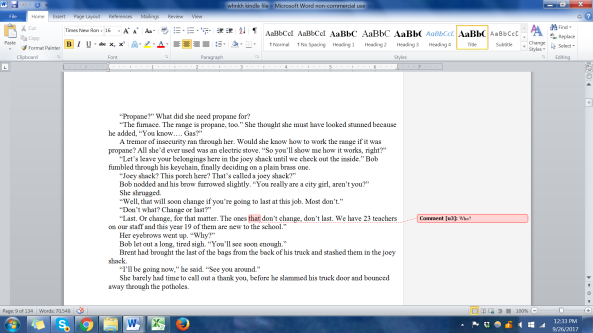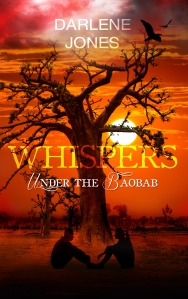Do writers sit in a coffee shop or work at home? Do they insist on silence or handle noise by tuning it out? Long hand? Computer? Typewriter? Voice entry?
Haruki Murakami (
http://ow.ly/RUSX308ju8Y) says, “When I’m in writing mode for a novel, I get up at four a.m. and work for five to six hours. In the afternoon, I run for ten kilometers or swim for fifteen hundred meters (or do both), then I read a bit and listen to some music. I go to bed at nine p.m.”
I go around 6:30 in the morning. I have a bedroom, with a bed, a table, and a bath. I have Roget’s Thesaurus, a dictionary, and the Bible. I have all the paintings and any decoration taken out of the room. I ask the management and housekeeping not to enter the room, just in case I’ve thrown a piece of paper on the floor, I don’t want it discarded. But I’ve never slept there, I’m usually out of there by 2. And then I go home and I read what I’ve written that morning, and I try to edit then. Clean it up.”
Emily St. Jonh Mandel, author of Last Night in Montreal (Unbridled Books, 2009) and The Singer’s Gun (Unbridled, May 2010):
“I do most of my writing in my home office, at my unbelievably messy desk. It’s by far my favorite place to write—my cats and my music are there, and it’s a very peaceful room. I live in Brooklyn and work at a university in Manhattan, and I get off work in the mid-afternoon. Often if I have theatre tickets or some other plans that require me to be in Manhattan that evening, I’ll linger at work for a few hours. When that happens, I go to the library at the university where I work and write there for a while. Often, very often, I’ll find myself writing in the subway. I spend two hours a day on the F train, five days a week, and I always carry a notebook with me.”
Alexander Chee, author of Edinburgh (Picador, 2002) and the forthcoming The Queen of the Night:
“Usually it’s trains where I get the most writing done—I wish I could get a residency from Amtrak on a sleeper car, or an office booth in a cafe car. I recently had a residency at a colony in Florida, where I had two days of writing 17 pages a day and it would have continued if I hadn’t had to leave. I think anonymity and displacement help me no matter where I am—I need to feel like I’ve vanished and no one can find me.”
Nova Ren Suma, author of Dani Noir (Aladdin/Simon & Schuster, 2009) and Imaginary Girls (Dutton, summer 2011):
“I live in a tiny apartment in New York and can sometimes be found writing first thing in the mornings at a cafe, if I can find a good table, but I don’t stay there for long. There are the crowds. The noise. I can’t control the music on the stereo. The real place where I get most of my writing done is called the Writers Room. Billed as an urban writers’ colony in New York City, it’s a place for writers of all genres to go for space, quiet, and uninterrupted time to work. At various desks in the giant loft space of the Writers Room, I’ve written, no exaggeration, thousands of pages. When you pay for an ‘office space’ like this and have a dedicated place to go, one filled with other working writers typing up their own pages, it makes you all the more motivated to do your own work.”
And the rest of us?
I believe most authors (like me) work at home, at a desk tucked in a corner somewhere, tuning out the normal noises of family going about their daily lives (or wearing earplugs) and adjusting their schedule to the demands of life.
Others don’t have it so good. My Nigerian writer friend says:
Pls you may have to ignore the doc I sent in my previous email. Because of the acute shortage of power I am sort of working under duress. Once I fix my gen I’ll be able to work freely.
And later:
I’ve serviced my generator and now I don’t have to depend on the government for power.
Like many other peace-abiding Nigerians, we somehow still manage to survive. Everyday is an ordeal and sometimes I can’t help but feel the Lord God is punishing us all for the crimes some of us (including the cabal) made by turning to the legendary tyrant Buhari. Nigeria’s pitiful condition is an open book. A researcher some years ago said we are the “Happiest People on Earth.” I wonder if this survey will stand the test of time.
Robert J. Sawyer says it best in answer to this question.
“Name some of the rituals or habits you indulge in while writing.”
Not to be dismissive, but the answer is (a) none, and (b) it should be none. A writer needs to write, period. He or she can’t wait for the muse, shouldn’t need peace and quiet and isn’t entitled to perfect conditions or the perfect spot. Rituals? Fingers on the home typing row. Habits? Getting down to work, whether it’s in my home, on a plane, in a hotel room or (among other places I’ve actually opened up my computer and started writing) in the ruins of Pompeii, on a ferry in Australia or on a park bench in the Yukon.
www.darlenejonesaauthor.com























